Chapter 13: Dealing with cancer
Category:
Tags:
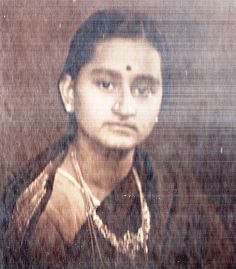
Visalam Balasubramanian was born in Pollachi, on May 17, 1925. She was the second of three children. Having lost her mother at about age 2, she grew up with her siblings, cared for by her father who lived out his life as a widower in Erode. She was married in 1939. Her adult life revolved entirely around her husband and four children. She was a gifted vocalist in the Carnatic tradition, and very well read. Visalam passed away on February 20, 2005.
Editor's note: This is Part 13 - the last part - of her memoirs, which have been edited for this website. Kamakshi Balasubramanian, her daughter, has added some parenthetical explanatory notes in italics.
Part 1 Part 2 Part 3 Part 4 Part 5 Part 6 Part 7 Part 8 Part 9 Part 10 Part 11 Part 12
Speaking of different illnesses or sickness during various times of my life, I can say one or two could have been avoided. For instance, an attack of severe arthritis pain I had in Trichy in late '47 could have been prevented. I had had throat inflammation a little before. I should have protected myself from walking on wet floors. Half the time my constipation was of my own making. It was so then. Such was the case in the earlier days. Not so later. Not so at all.
I never learned to eat well. That was a chronic problem but I was unaware of it. I believed I ate enough and certainly well.
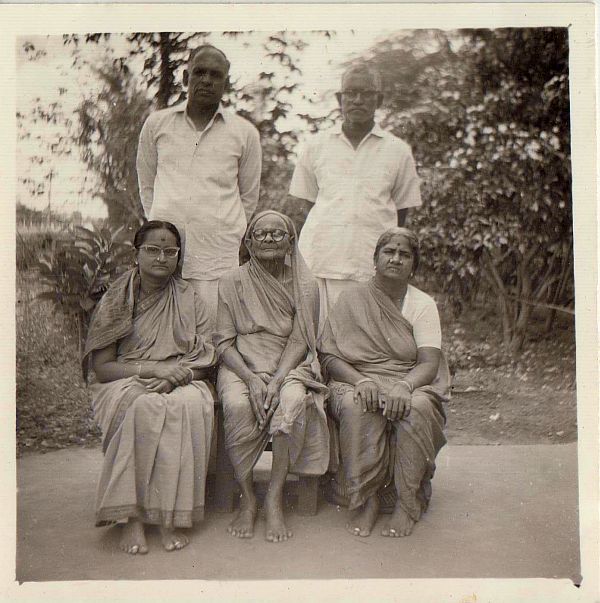
L to R: Standing: TVB, his brother Narayanan Sitting Visalam in her early 40s, Visalam's mother-in-law, Parvatham, Narayanan's wife. c. 1965. Samayanallur
When I was nearing 40 I began to get frequent attacks of chest pain. Twisting and searing, it came in spasms, and at times lasted for hours, leaving me exhausted. Doctors invariably suspected some kind of cardiac problem, but I knew and insisted it was not that.
This went on for years, and all of my vital organs were declared to be in good condition. Some of the tests were repeated twice, thrice. Tests like Barium X-ray, chest X-ray, ECG. One senior surgeon, an authority on gall bladder, after a series of examinations found that there was a large stone in my gall bladder, and concluded that was the cause of the pain.
When the senior physician told us about the stone, my FIRST feeling was great relief. TVB was shocked and stunned. Expecting a reaction of shock or alarm from me and preparing for that, the doctor sang in bits, made dancing movements, talked about how professionally active Col. Iyer (the surgeon) still was, and only then disclosed the presence of a stone. I felt relieved because TVB was holding that my problem was psychological!
Anyway, the stone was removed.
But my chest pains only increased in intensity as well as frequency, even duration. About a year later when we had come to Madras, a young doctor who came to see my mother-in-law said they had better check my blood for anaemia. Dr. Natesa anna, TVB's cousin, happened to be there and he wanted the test and result to be more specific. Thus, I was given B 12 injections periodically along with Vitamin B 12 capsules taken daily.
Coming to the cancer that is now taken residence in my system and wholly occupying TVB's mind, it took the doctors sufficiently long to suspect and diagnose it as such. I am not blaming any doctor. Not one bit. I am only saying that TVB torments himself. An early detection is supposed to ensure cure. Detection, diagnosis, cure or remission - there are many factors that decide these. The type of cancer. The site. Age of the patient. TVB knows all these things. But he would still wish to hold in check, arrest it, stunt it, reverse (?) it, even slightly, if possible. Of course he does not blame himself or the doctors.
The knowledge that such a dreadful malady could take possession of one, whom he has been closely watching, is galling. Fact is that the type of cancer I have got is supposed to be the best. Sounds stupid, but just as there are worst kinds of an affliction there are also comparatively better ones in the matter of its virulence, etc. My view of this is it does not give me any trouble. Does not restrict or hinder my movements. Does not affect my mental balance. Is not visible on the outside at all. It just sits there, growing slowly, creeping into areas that are accessible. It does not exceed its limits. Knows the rules and the laws.
Like piling up of sandbags, TVB keeps me well-nourished with iron, vitamins, proteins, potassium, calcium, so that the wayward cells have to cross barriers to intrude into adjoining areas.

Visalam and TVB at a family pooja, 1970s.
How my cancer came to be diagnosed
I felt a small lump, something like a salivary gland enlargement, below my left ear with a slight pricking pain in a tiny area, that too not constantly, and a slight redness. Although it was hardly worth any attention, I applied Iodex (a pain-relief salve). It was like a half of a perfectly made marble. Another one exactly alike appeared the next morning on the right side. One on the right side was even less painful but firm and hard to the touch.
I took off my earrings and generously rubbed Iodex on both. The occasional pricking sensation and even the slight pain disappeared soon, say within a week. But there was no change in the swelling. The lumps neither diminished nor grew bigger. Shape did not change. One on the right was a shade smaller. Though they were like (two hemispheres?) two halves of a marble, they wouldn't have fitted one against the other.
I remember showing these to Dr. Sairam more than once. They had got somewhat submerged or concealed by growth of flesh around. He felt those but did not take any notice. After a few months of persistent questioning by me and some smaller globular glands forming to the front of those original hemispheres, he said I may have lice in my scalp.
Age had softened me by then. That is why he escaped my wrath. Had he said that when I was young, I would have blasted him.
I am so particular about a clean scalp and clean teeth. He gave me two courses of antibiotics. Nothing worked. The glands appeared indifferent to medicines. They were left alone.
Months passed. Whenever I caught a cold or sore throat, new glands came up and the old ones seemed to sort of register a protest. I felt they suddenly grew in size and acquired a strange kind of hardness. Dr. Sairam said glands were like switch boxes or something and they indicate infections--even mild ones that may go unnoticed--and these acted as warning symptoms. Among several other drugs, he prescribed Stelabid now and then. Certain components in it went to paralyse the base of my tongue. I felt a heavy drag in the back portion of my neck, a general thickening heaviness (this was only a feeling) in the back, back of the legs, etc.
TVB got angry, and said I imagined a lot of things when any medicine was given. He said though there was nothing the matter with those glands I was making a fuss, etc. etc. "No doctor is able to find out the cause of your ailments because they exist and flourish in your mind. Many people have worse things, but they manage. They live with it, quietly taking medicines, palliatives. Observing certain rules/restrictions in their lifestyle. You won't do any of those. You won't take medicines regularly. You have no faith in them. But, you will keep on saying ‘There is a strange feeling here. A stiffness there.' The trouble with you is you have no specific complaint."
This was his summing up then. It is still the same. He said if moving my tongue to speak was getting difficult, it was very good indeed. I will have less to say, and he less to listen to. When I found my condition was worsening, I insisted on seeing Dr. Tirugnanasambandham, a neighbour and old friend. He said that a side effect of Stelabid could show up like this. Next day Dr. Sairam wrote out the name of that particular component responsible for my problem, and advised me to mention that in future to doctors.
At that time, we used to travel often between Madras and Hyderabad. Spending time with Ramesh, Papu and Savithri, who were all in Hyderabad.
During one such stay, I developed a block in my ears, most pronounced in my left ear. Consulted a noted ENT specialist. I mentioned the glands in my neck, below my ears, to him. He gave me two courses of antibiotics. My ear blocks remained the same. He advised leaving it alone. By then it was nearly two years since the first two glands showed up. Big ones were growing bigger, and new small ones were coming up on all sides of my neck.
Radha had just left for the U.S. with the intention of staying on to get green card status. Till then she was shuttling between India and the US on her student visa.
Now, I worried about my looks. Most unusual. I began to worry that these glands may begin to protrude out all over my neck and jaws, and people might feel repulsed.
So, once again I insisted that we find out what caused these. This time, Dr. Sairam was 'alerted'. He straight away said we will do exhaustive investigations, starting with blood tests, Mantoux test, and X-rays. If he was not satisfied, he would even order a biopsy. I was not at all scared at the mention of a biopsy.
Dr. Sairam wanted to clear doubts about my stomach because I vomited once in the clinic itself immediately after a routine Macrabin injection. Also I had been reporting to him of vomiting bouts at night occasionally which had no relation to the kind of food I had eaten or the kind of day I had had. I was also prey to heartburn. So, he sent me to the best gastroenterologist in the country, Dr. N. Madanagopalan. Not that he wanted a top person to see me. It so happened that he was a government doctor, and we were beneficiaries of the Central Government Health Scheme (CGHS).
Dr. Sairam was looking for tubercular complaint as well as cancer. But Dr. Madanagopalan had apparently no such doubts. On seeing the blood report, he said the stomach X-rays could wait. Quite unlike him and his ways, he called TVB into the consulting room. He asked us not to waste any time but go directly to the General Hospital, to Rangabhashyam's unit to be specific, and ask for Dr. Shanmukham, tell him that we were coming from Dr. Madanagopalan and give him the chit requesting biopsy.
We rushed according to his instructions, but could not get it done that day. Dr. Shanmukham, however, did it 4-5 days later. He asked us to get the proper tests done at a private pathology laboratory giving us the specimen, cut out of a node from my neck.
That day from 9 in the morning till practically 5 in the evening, TVB was driving the car and I was in the front seat holding the test tube in hand. Going from one lab to another in search of one where they had the facility to carry out the required test. We came home once to have luncheon. By phoning we found out that V.H.S. hospital in Adyar had the facility but they close the lab by 1.00 p.m. Since Murali was the Chief Superintendent (he being a second cousin on my mother's side -KB), he asked his lab personnel to keep open the lab, take the specimen from me first and then go through the formality of payment, etc.
The results were given two days later. The pathologist had put a question mark on his finding. Col. Iyer, with whom we were in touch wasn't satisfied, so he sent the slides to the Indian Council of Medical Research in Delhi. TVB arranged to get the result relayed over the phone before getting the slides and papers back by post.
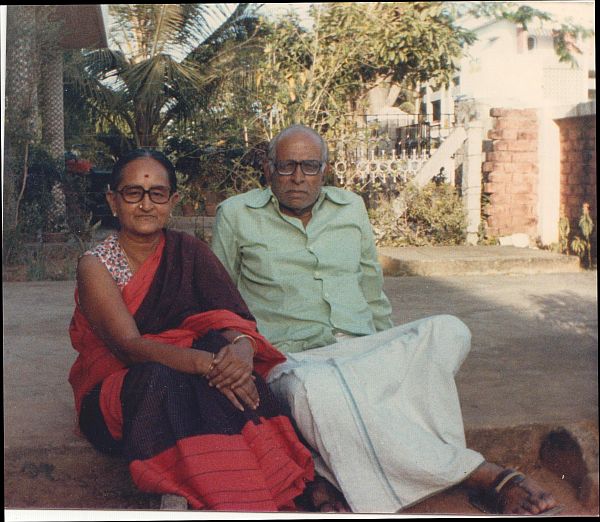
Visalam and TVB, 1983(?) Chennai
The diagnosis was Differentiated Non-Hodgkins Lymphocytic Lymphoma, Stage IV B. TVB was shattered. I took it in a matter of fact way then and still feel the same.
Driving was difficult that day because it was Kaanum Pongal. the concluding day of the 3-day long Pongal festivities, and it was crowded everywhere. Entire families consisting of children, old people, gaily dressed, dawdled along. It seems to be a custom in Madras. People go out to meet friends and relatives. On the way, they move slowly and stand looking at passing groups of people.
Even before we came out of the hospital gates, the sticking plaster with the dressing from my neck fell off. I had to manage it with one hand while holding the test tube containing the specimen precariously with the other. Considering the dust and the fumes, we wanted to shut the glass window on my side in view of the exposed incision. We had left it open till then. In the unruly traffic, TVB could not lean across to close the window.
Anyway, we made it to the CGHS dispensary, Anna Nagar, where Dr. Anjali Rao was on so called emergency duty, as it was past their working time. She decided to use the dressing the GH doctor had applied. She dusted some antiseptic powder on the incision, and held it in place with long strips of plaster.
My taking it calmly is not to be construed as wisdom on my part. First, I did not know the type of cancer. I did not know the stage. So, ignorance was a factor. I knew, of course, cancer was a dreadful affliction. I had heard the word 'cure' used in connection with cancer, as a result of modern development and research. So, I believed, even if it recurred or something there were medicines to keep a person comfortable. Pain may be controlled. Seeing that for two years I never had any pain, I was confident that that must be a painless type.
But afraid I was not. Even if it meant that this would ring the final bell out for me. I do not know if I am that insensitive as not to feel fear at the prospect of death. A life, lifetime, fits the proverb "Time and tide wait for no man." I was born. It was not with my knowledge or consent that I was born. I grew up. Emotional upheavals, physical growth, were all controlled by some power that was not directed by me. The same power is going to take care of the future. If that power has been so good to me at all times, it certainly is not going to desert me now.
My not feeling afraid was not because I had thought of or put forth all those arguments. I simply did not feel it. Once again, as before, I felt relief. I felt vindicated and justified in having insisted on finding out what this was. Though I have been proved right, TVB still accuses me of being fanciful. My initial thought was, as on the previous occasion, "Ah, a doctor has diagnosed my complaint. There is no truth, no ground for anyone to think that I have imagined something. Also, I need not suffer from some unknown, undiagnosed problem. Since they know now what it is, they also know, for sure, what the treatment is. They won't grope in the dark."
I was quite ready for treatment. Little did I know what the treatment was like!
Metaphorically, I'd say, the fire that burns inside, in the name of medicine, if it burnt outside, even the ashes would get lost. There won't be anything to pick up. Nothing will be left.
Another point about the treatment. However awesome, once one has begun a course, it will not do to stop it halfway. It would be senseless to do so. One might have left it - the disease - alone without trying to chop off its fangs. Then probably it wouldn't show its force. But once it is given recognition by way of combating it, well, one has woken up a sleeping, hungry tiger. Until you tame it with at least a tranquillizer and gain some breathing time to look around and take stock of the surroundings, you cannot rest peacefully.
Similarly, treatment, once started, has to continue. This is the result of the knowledge one has of cancer itself, the effect and nature of the surviving cells that escape chemotherapy, etc. Cells that survive the first shot become resistant to the drug. Also all the cancerous cells are not destroyed with the first dose, even though good, healthy cells get destroyed along with the cancerous ones for which the drug is given. So, drugs have to be administered at intervals. Something like cutting grass or hair.
Since good cells get destroyed, general health and resistance go down to almost nil level. Necessarily time has to be given for the blood to build up. This takes about 3 to 4 weeks. The body is now ready to take another dose to destroy/fight off the new cancerous cells. Thus it goes on till the tests show there are no more sick cells. It is then a period of remission. Just like in diabetes, here too we have not reached a stage where one could confidently say 'cure' 'eradication' for cancer. If the complaint does not reappear within the next 5 years, they say one is out of it, cured.
About the time I was under treatment
There are no adequate words to describe the suffering, the agitation I experienced nor to describe the support, love, concern, and devotion I got from my daughters, TVB's niece, Sarasa, friends and neighbours. I can use all superlatives. They will fall short of my sense of gratitude. Each one had an individual way. But, no one showed the anxiety they felt at any time to me either in their face or in their words. They were always uniformly calm, encouraging, entertaining. I never gauged how desperate they felt at times. I knew they would have worried because my condition was bad. I did not see the worry on their faces. In addition to bearing the burden of so much agony, they also had to mask it when they were with me.
I am not comparing one with another. I am only trying to put down my recollections. Papu rushed from Bangalore to be with me, with us, for the very first investigation with hospitalization. A week later treatment commenced. Sarasa had said before that she can and will come and stay with us to help out. Natesan, TVB's nephew, had offered his help. There is a well-known cancer hospital in Adyar.
TVB had to decide which was the better place to go to. General Hospital, which comes under our CGHS scheme or the specialised place. Papu went round, seeing the arrangements, talking to doctors, dieticians, housekeeper and the like. With the G.H. it was possible to keep me at home, know the medicines as we procured them ourselves, whereas in the Adyar centre they keep the patient for some days. We wouldn't be told what medicine is being given. Except during visiting hours, no one can come to see the patient. The housekeeper there happened to be Margham's (an old friend of Visalam and TVB) daughter, so she said anyone can stay in her quarters and be able to drop in on me anytime. Not knowing the medicine, tonics, etc. was not to TVB's liking. TVB and Papu decided that we will buy all the medicines, get the injections administered by the staff at the cancer department in G.H., bring me home.
The doctors in India usually take their profession seriously. They are not callous. They take interest in the patient, give proper advice and guide the patient. But unfortunately for us, the specialist - a person with accurate knowledge perhaps but utterly lacking in humane outlook or tendency, absolute disregard for the person who came to him for treatment and an arrogant, intolerant demeanour - to whom we went, failed to tell us that I must have a good breakfast before taking the injection. We went to him because Dr. Sairam, whom we trusted, recommended his name. This specialist was Dr. Bellarmine. I would still say, "Blast him," even today.
On receiving the first injection of Vincristine/Andoxon I collapsed. Several doctors came running, tried to revive me. Only TVB was with me. Sarasa could not come as a new cook had just then come as we were leaving for the hospital. Sarasa could not leave the house in the care of an unknown person, nor could we turn her away - even ask her to wait - for fear that she may not come back. We needed a full time cook.
One doctor asked what I had eaten, and learnt nothing solid or substantial. He asked TVB to rush out and get a cup of coffee with plenty of sugar in it. TVB was reluctant to leave me and go. He could not make anyone else fetch that coffee by requesting them. So he went, got coffee and poured it down my throat. I was conscious throughout.
The first injection was on a Thursday. Next morning, Papu arrived. It was as though everything inside me had crumbled. I couldn't eat, couldn't speak, couldn't sleep, nor could I keep my eyes open. There were capsules and tablets, of different shapes and colours, numbering something like 8-10 each time for five days or seven days - doctors directed it - following the injection.
Sarasa kept count meticulously. She used different tactics, language, sometimes when I protested or remonstrated. She always came with a bright smile, looking like she was bringing a delicious cake for me to taste. She would say curtly sometimes, "Enough for now. You have been talking, tiring yourself for half an hour. Time for you to close your eyes. Hmmm. Open your mouth. Swallow these and QUIET." At other times, she'd say, sweetly, "I don't ask you to do anything. Only just lean on me. Open your mouth. I pop these small tiny ones. No taste, nothing. Swallow. Finished. Try to rest." Occasionally, she'd speak as if she was disgusted. "Have you finished? I am here, watching you go on and on. We don't want to hear anymore. Sleep."
Following that first injection what my condition was, I think only TVB, Papu, and Sarasa knew. I only guess they got frightened. Papu ran to see the doctors at G.H. When they weren't helpful in answering her questions she raised her voice, shouted and indicated to them what the consequences would be and what they would be made to face if anything untoward happened to me.
That made them wake up. They suggested I could be put on glucose drips. She did not want to waste time - even minutes - telling them how they should have suggested this earlier. She came back, and I was put on drips. That was the first time. February 1987. We were caught unawares, I would say. It is not like TVB or Papu to let things take them away with the tide/current. They do a lot of reconnoitring before they would embark on something big like this, especially because they do not know much about it. The doctors in the local CGHS dispensary came forward and gave a lot of help.
From next time onwards we were more prepared. Savithri had come by then. Papu was not able to be at Madras continuously. Savithri and she took turns coming to Madras. Both were in Hyderabad then. Even during the first week of my suffering stage, Papu had been gathering information on how to look after a patient under chemotherapy. What food was best, etc., etc.
Quantities of tender coconut water, soups, fruit juice was sent down my throat. Ice cream and flavoured milk was being funnelled into me. If I ever protested that only a short while ago one or the other had given me something, the one who brought something would assert that I was mistaken\; I was sleeping, I was thinking of the day before.
The girls tried to make the stuff tasty, different every time, but they also lied brazenly. If I objected to soups being thick and rich, each one with astounding unity will say they poured much too much water by oversight or one would say that she understood my taste and she took it upon herself to dilute it much against the other's wishes. At least two of them were there by my side day and night.
I used a walking stick while moving around. All of my hair came out in clumps. Soon I was quite bald. Owing to steroids, I also looked bloated and pale. Never once did anyone, whether they came to see me formally or they were coming to help out in one way or another every day, say how sorry they were to see me look so different. They kept their expressions so normal and I never once caught any of them look shocked, horrified or sorry.
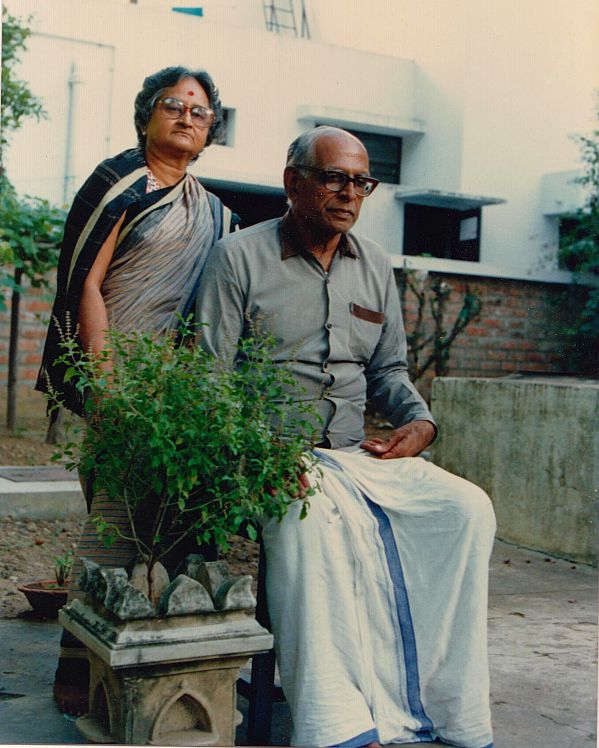
Visalam and TVB, 1986-87. The aftermath of chemotherapy left Visalam with no hair. This picture was taken when her hair had just begun to grow back.
Our nearest neighbours happened to be Muslims. They had been our friends for years. Mrs. Moosa, the lady next door was a direct sort of person. She was intolerant of people who might make me tired, or otherwise uncomfortable in any small or big way. If she saw such people coming into our house, she would follow them. She would gesticulate from another side of the room to my children suggesting that they be made to leave. Often they did. Supposing the visitor stayed on, she would call out and pester my daughters from an outside verandah or next room asking for something. The visitors left finding that my daughters are not able to sit long enough to speak to them.
Another Muslim lady, Mrs. Shariff, living in the house opposite ours often sent some light breakfast or snacks, because coming from somewhere else, I wouldn't refuse to take it. She also dropped in often. She never stayed long but her departure never appeared abrupt.
She talked sense. I used to think and say that spending all that attention, medication, on an old person like me did not at all make sense. Putting me through so much misery and suffering for recovery. A younger person who had family responsibilities must live longer but not a person who had discharged all her duties, and is only waiting for the end. It was she who told me once that TVB would feel lonely, and I had to get well for his sake. I didn't agree. Another time, she told me that all of them were doing so much because (1) they knew I would get well, (2) they had use for me\; otherwise they won't be wasting time. That kind of stark statement put me back on the rails.
There was one Mrs. Sankaran. She often came during daytime. She'd offer to give me juice, soup, etc. and tell my daughters to go and rest. My daughters, especially if only one was staying at that time, would ask Mrs. Sankaran and Mrs. Shariff to sit with me if they had to go out for something. Those two always spoke to each other in a monotonous, droning voice without addressing me, so as to make me fall asleep.
Kamakshi adds: She survived the cancer. Visalam's memoirs end here. We shall never know why she stopped writing at this point.
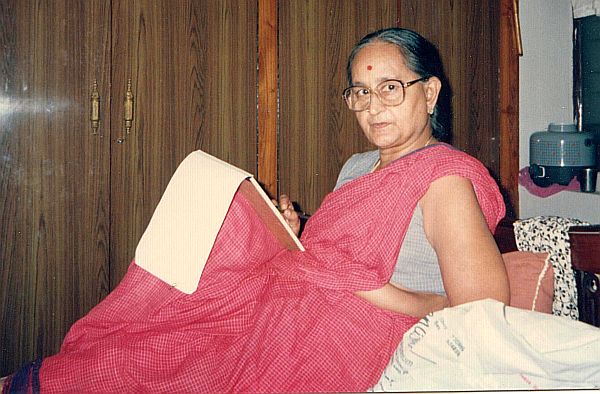
Visalam. 1993-94. By this time, she had beaten the cancer. Hyderabad.
____________________________________________________
© Kamakshi Balasubramanian 2016
Editor's note: I approve all comments written by people\; the comments must be related to the story. The purpose of the approval process is to prevent unwanted comments, inserted by software robots, which have nothing to do with the story. If you are unable to solve the puzzle, send an email to indiaofthepast@gmail.com.
Comments
Add new comment